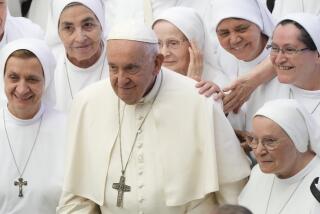Time to Repent History’s Sins, Pope Says : Religion: Catholics urged to purify themselves before crossing ‘threshold of the new millennium.’
- Share via
VATICAN CITY — Looking ahead to the year 2000, Pope John Paul II demanded Monday that his church publicly repent for sins committed by Catholics across history in errant, overzealous defense of their faith.
The Roman Catholic Church, according to the Pope, “cannot cross the threshold of the new millennium without encouraging her children to purify themselves, through repentance, of past errors and instances of infidelity, inconsistency and slowness to act.”
The major papal policy statement came in a 16,000-word letter to Catholics that emerged from deliberations in June by cardinals considering how their church should enter its third millennium.
In context, Monday’s letter represents a papal riposte to prophets of doom in Rome and at the Vatican who believe that John Paul’s papacy is waning in infirmity.
The 74-year-old pontiff, who is recovering slowly from a broken leg, makes clear in the letter that his world travels remain a major priority. As if for emphasis, John Paul made a point of telling a delegation of Bulgarians who visited him Monday that he hopes to visit their homeland.
“It is my fervent wish to visit Sarajevo in Bosnia-Herzegovina and the Middle East: Lebanon, Jerusalem and the Holy Land,” the Pope writes the 950 million members of his church. In the year 2000, John Paul says, he would like to visit biblical lands “through Egypt and Mt. Sinai, as far as Damascus.”
In his letter, John Paul outlines plans for a series of reflections, meetings and ceremonies building up to 2000, which his church will celebrate as a “great jubilee which will take place simultaneously in the Holy Land, in Rome and in local churches around the world.”
Examining errors of the past is important for the church’s next millennium, John Paul tells Catholics in the letter.
“The church should become more fully conscious of the sinfulness of her children; recalling all those times in history when they departed from the spirit of Christ and his Gospel and . . . indulged in ways of thinking and acting which were truly forms of counter-witness and scandal,” he adds.
The Pope does not dwell on particular cases, but they will be forthcoming as grist of the self-examination he seeks: A Catholic’s confession must be specific for a priest to grant absolution.
“Another painful chapter of history to which the sons and daughters of the church must return with a spirit of repentance is that of the acquiescence given, certainly in certain centuries, to intolerance, and even to the use of violence in the service of the truth.”
The Pope’s invitation is to re-examine the church’s role as a pillar of Western civilization in which it ruled for many centuries as both a spiritual and temporal power.
In this millennium, the Crusades, dissolute Popes whose lust for power fueled Protestant revolt, and the courts of the Spanish Inquisition are all dark pages in church history. So, too, was the forced evangelization of the New World, intolerance of other religions and the church’s failure to speak strongly against slavery in the Americas or this century’s Holocaust.
In the past, the Pope writes, cultural conditioning may have allowed Catholics to believe that “an authentic witness to the truth could include suppressing the opinions of others, or at least paying no attention to them.”
Even so, he says, “mitigating factors do not exonerate the church from the obligation to express profound regret for the weaknesses of so many of her sons and daughters who sullied her face.”
Among the sins that require “a greater commitment to repentance and conversion” in the papal view are those that divided Christians. As this millennium ends, John Paul laments, wounds between religions are even deeper than they were in the first 1,000 years after the death of Christ.
Inter-religious dialogue should have a preeminent role in celebrations of the millennium, the Pope says, calling for special emphasis on talks by Christians with Jews and Muslims.
More to Read
Sign up for Essential California
The most important California stories and recommendations in your inbox every morning.
You may occasionally receive promotional content from the Los Angeles Times.













